Grief in the Pantry Line

When I think of grief, Lemon Balm Betty surfaces from my memory banks. She ran around the parking lot outside the food pantry as fast as her feet would carry her, yelling at the top of her lungs “Thurman Greco is a f*** a****!
She carried anguish and anger like twins. When anger bubbled up and yelled and yelled, anguish followed.
“I don’t think she’s ever going to smile again.” I thought to myself whenever I saw her run her circle around the parking lot.
One day she brought an armload of peppermint. I put it out in the pantry for shoppers.
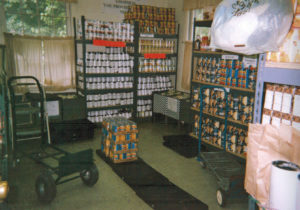
When she saw her donation in the fresh produce section, a smile lit up her whole being. Finally!
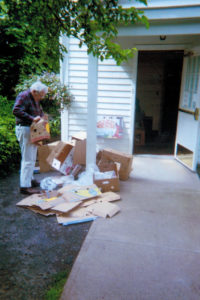
In days past, we all looked for security and some of us found it.
But then, things spun out of control and our lives began over in the pantry.
Despair was unavoidable.
Fearful shoppers were uncomfortable and felt hurt in their hearts, clear down to their first chakras.
When we realized how vulnerable and insecure we were, distress happened. .
No one talked about it much, but people working and shopping in a pantry lost a lot: jobs, family, (not to mention the house and everything in it), friends, self-respect, self-love.
They lived an ongoing series of losses.
In the pantry, we all just ducked our heads and pressed on. Hungry people lived with the specter of what if:
What if I hadn’t lost my job?
What if I hadn’t come down with cancer?
What if I hadn’t lost my car?
It was all loss: a lost job, the death of a loved one, a foreclosed home. Loss triggered feelings and it was all incredibly lonely.
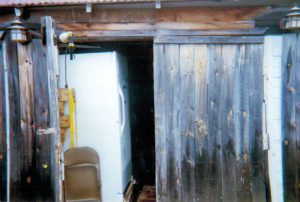
Occasionally I saw people crying in the pantry. And, truth be told, I cried in the pantry a few times as well.
Sometimes I cried silently. Once I wailed loud, earth shaking, tears. I was intensely afraid the pantry would shut down. I knew there was no other place to feed the people.
I don’t remember what made me become so emotional that day. The reason I cried escapes me now because why I sobbed wasn’t important.
More important, the pantry was a safe place for us all or no one would have shed a tear. Safety allowed me to let my guard down for just a moment to shed tears I needed to cry.
This I do remember: I cried tears for us all in the building that day as numbness wore off.
Wounds needed tears to heal. Once this happened, we tried to move forward again. Drugs numbed and masked the pain, but there were no pills to heal wounds.
This journey confronted traumas, and finally resolved things lost. A despondent person moved forward never leaving grief behind. The pain and the journey relied on emotional suffering.
Weekly trips to the pantry left us all with unfinished business. It was impossible to lose so much with a clean break.
Travelling to the pantry, our lives were up and down. We carried happy and sad memories with us in the pantry room. Disaster was the new normal.
Tears paved the way for the good luck we experienced after the feelings of sadness and loss diminished.
Sadness had to be experienced.
The journey attracted spine and joint problems, respiratory problems, irritable bowel syndrome, bronchitis, asthma, pulmonary issues.
Our situations needed to be experienced honestly. Denying grief got no one anywhere. I was honest with myself about the sorrow I felt for the pantry.
If I hadn’t been, I would have lost it to those who didn’t approve of me and the hungry people the volunteers fed.
We each faced a challenge: How to figure out who we were at the moment and who we hoped to be in the future.
In the middle of all this, we carved out a place in the new reality we found. Then we could each define who we were in our new surroundings and in the community.
When we wrote our new stories and tried on our new identities, we saw the past, the present, and the future blended together.
The new stories brought depended on newly discovered talents and strengths. A new voice surfaced. I felt it drowned out the negativity. When this happened, we were ready for a new life.
Maybe.
What about a new home, family, pet, job, car? We all had different relationships to repair and rebuild.
Each person working in the pantry or walking through the shopping line felt loss differently.
This was our spiritual work. Some were lucky enough to move on to a different town, a job, a different family.
But nobody walked away from this loss , pain, and grief. So, it was okay when we stayed in town together as we picked up the pieces of our lives.
I recognized this new voice whenever I heard “I won’t be coming again. I got a new job and I’m moving on.”
Things didn’t always make sense because the voice was filled with anxiety, struggles, and disappointments. In the end, it all came down to discovering what worked and what didn’t.
Each of us saw this uniquely.

Rita lived in the Saugerties/Palenville area before Hurricane Irene. That storm cost her everything. One day her life was normal and the next she had nothing.
The most anyone could say about Rita was that she was homeless.
A mutual friend, Lorene, found Rita a worn-out pickup somebody couldn’t sell or even give away.
Until I looked closely at it, I didn’t even know what color it was.
I knew what color the tires were, though: slick and bald.
Rita got the pickup and the key that went with it. She put the key in the ignition and turned it. The motor came to life. It got her to the gas station. Hurrah!
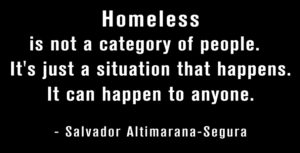
She began her life over by doing anything that anybody needed to have done for $10 an hour and lunch.
She cleaned out flooded houses and sheds. She hauled trash to the dump. She used her computer skills when somebody needed administrative savvy.
Her clothes came from Family of Woodstock.
She rented a room in somebody’s house and was finally not sleeping in the pickup.
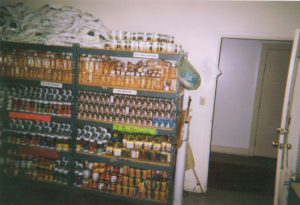
Whenever she worked in Woodstock on Wednesdays, she shopped at the pantry.
I’ll say this about Rita. She never grumbled. With a smile on her face, she always acted as if the pantry food was the best she had ever eaten.
And never, not even once, did she complain about the ancient jalopy pickup rig she drove around.
As far as I could tell, she never lost hope. Without hope, I don’t think she would ever have made it to the other side – wherever that was.
I never once asked her how she got the pickup repaired and I never even looked near the inspection sticker. Frankly, I was afraid to ask. I was afraid she would tell me.
Truthfully, Rita was no different from any of the rest of us shopping and volunteering in the pantry.
She had to figure out how much of her past she could rebuild. And she had to figure out how much of her past she was simply going to close the door on as she moved into the future after Hurricane Irene.
Rita gave up much beyond her material possessions. She gave up everything that she felt stood in the way of a successful future. For Rita, quitting was something she couldn’t afford.
She gave up rear vision. Looking into her past simply didn’t happen to Rita. She gave up bitterness and seeing wrongs. This meant she gave a person a second chance, and even a third if they needed it.
She gave up waiting and putting off something beccause the stars and planets weren’t properly aligned. She gave up criticism. This included self as well as others.
Rita was the right person in the right place in the right job to be able to unfold her path in front of her. She carried on each day as if she truly believed it was better than yesterday.
She walked as if blessings were all around her.
Each day, every day, Rita risked whatever was necessary to rebuild her life. Rita embraced the future while renouncing her past. She never quit.
Rita was our poster child. She found meaning each day, even in the worst situations and the most inhumane conditions.

Thank you for reading this article. Please refer it to your preferred social media network.
Share it with your friends.
Because of its spirituality, this article could fit easily in www.reflexologyforthespirit.com. Because of the food pantry setting, here it is in www.hungerisnotadisease.com.
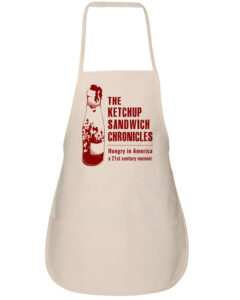
![]()
Thanks
Thurman Greco




